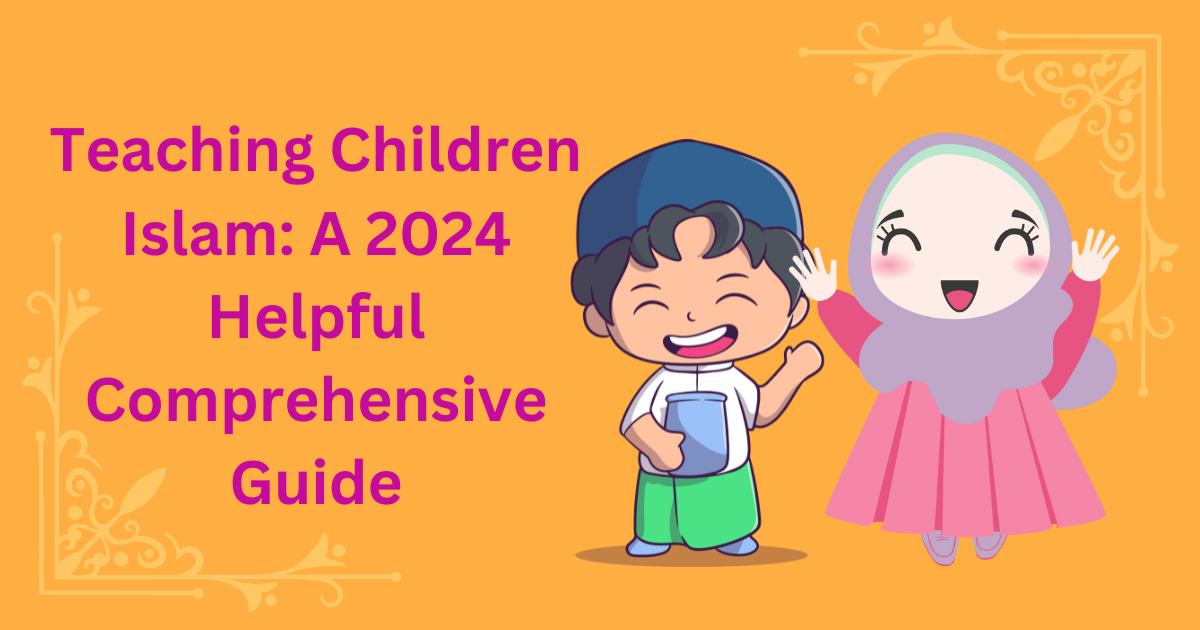Teaching children Islam is a sacred mission. It goes beyond simply providing information. It is a life-long journey that has to do with nurturing faith in those young hearts, shaping their character with strong moral principles, and guiding them to lead a life based on divine guidance and teachings.
By sharing the inspiring teachings of the Holy Quran and the exemplary life of Prophet Muhammad (peace be upon him), we are building a future generation of kind, upright, and self-confident Muslims.
A child’s Islamic education starts at home with their parents as the primary instructors. It is vital to present Islam to children in a way that’s fun, interesting, and meaningful to them. By using age-appropriate teaching methods, providing a supportive environment at home, and demonstrating Islamic values through personal actions, we can foster a lasting love for Islam in our children’s souls.
In this Article, we will discuss the concept of teaching children Islam, when to start such a kind of teaching for children and how. Also, we will tackle some fun ways to teach children Islam as well as some practical tips to follow to accomplish this noble mission.
Table of Contents
When to Start Teaching Children Islam?
The ideal age to start teaching children Islam is as early as possible. While there are no strict rules, many experts suggest starting the foundational teachings at around the age of 2 or 3. That’s the age when the child begins to know about good and bad, and what is acceptable and what is not.
It is a fact that children are much like sponges, absorbing information instantly from whoever is around them. So it is always advisable to begin introducing basic Islamic concepts as soon as they can understand.
These can be as simple as the concept of Allah as the one and only Creator, Prophet Muhammad (peace be upon him) as the Seal of Allah’s messengers to mankind, the Quran as the final divine word of Allah, and the life of Prophet Muhammad (peace be upon him) as the moral compass for us all.
How to Teach Islam to a Child?
Teaching Islam to children is a beautiful journey that involves nurturing their hearts, minds, and souls. Here are some essential steps to guide you in this noble mission:
1- Make the Quran, Hadith, and stories of the prophets and good people the criteria:
From an early age, make sure to teach your child good Islamic manners that the Quran and the Hadiths dictate. Also, make them familiar with the stories of other prophets and righteous people so that they will be willing to follow their example.
2- Be consistent:
Maintain a consistent approach as far as teaching children Islam is concerned, even when faced with challenges or setbacks. This is especially true with the prayer issue. You should ask your child, time after time, to perform their 5 daily prayers on time. This should be done until prayers become part and parcel of their day. Only then can you sit back and let them pray independently.
In this context, Prophet Muhammad (peace be upon him) said:
“Teach a boy Salat (the prayer) when he attains the age of seven years, and punish him (if he does not offer it) at ten. (Riyad as-Salihin 302)
علموا الصبي الصلاة لسبع سنين واضربوه عليها ابن عشر سنين””
Here, Prophet Muhammad (peace be upon him) urges Muslim parents and educators to teach a child to pray when they are only 7 and to punish them if they don’t do it when they are 10.
3- Lead by example:
Children learn by observing. So make sure to demonstrate Islamic values and practices in your daily life through your actions, such as kindness, patience, and honesty.
In this context, Allah says in the Quran:
“Do you preach righteousness and fail to practice it yourselves…” (The Quran, 2:44).
“أَتَأْمُرُونَ ٱلنَّاسَ بِٱلْبِرِّ وَتَنسَوْنَ أَنفُسَكُمْ…”
In this verse, Allah asks a rebukable question: how can you ask other people to be righteous and fail to practice what you preach yourselves”!
4- Create a positive environment:
Make your home a living demonstration of faith. Decorate it with Islamic art, have Quran recitation times, make a dedicated corner for prayer in your home, etc.
5- Use age-appropriate language:
Be flexible and explain Islamic concepts in simple terms that your child can understand. Use stories, analogies, and real-life examples.
It was narrated that Abdullah Ibn Masud said:
“It is the case that you do not relate to the people a narration which their minds cannot grasp except that it becomes a Fitnah for some of them.”
“عن عَبْدَ اللَّهِ بْنَ مَسْعُودٍ، قَالَ: “مَا أَنْتَ بِمُحَدِّثٍ قَوْمًا حَدِيثًا لاَ تَبْلُغُهُ عُقُولُهُمْ إِلاَّ كَانَ لِبَعْضِهِمْ فِتْنَةً
This concept is very important when it comes to speaking to children. The phrase of the Muslim great scholar, Ibn Masud, suggests that you should bear in mind how each individual will understand your words.
Don’t give young minds too complicated ideas and expect them to fully grasp them and ask for more. This will cause them Fitnah which means turning them away from what is right and good for them.
6- Instill high Islamic values and manners:
Teach your child(ren) Islamic etiquette and good manners in various social settings. For example, teach your child the value of honesty and the consequences of lying.
7- Involve your child in Islamic activities:
Involving your child in Islamic activities can greatly enhance their spiritual growth and understanding of their faith. Start by incorporating daily prayers together, making it a family routine. Encourage Quran recitation and memorization through engaging methods like apps or Quran classes.
Reading Islamic stories and books will instill moral lessons and knowledge about Islamic history. Engage in Islamic-themed arts and crafts to make learning fun and creative. Teach the importance of charity by involving them in activities like donating and community service.
Lastly, enroll them in Islamic classes or weekend schools and participate in community events to provide a structured and interactive learning environment.
8- Answer questions honestly:
When answering their questions, always provide truthful and age-appropriate information, which helps them develop a clear and reliable foundation of Islamic knowledge. Honesty in your responses fosters an environment of openness, where children feel comfortable asking questions and expressing their curiosity.
This approach not only strengthens their faith but also encourages critical thinking and a deeper appreciation of Islamic teachings. By consistently providing honest answers, you help your child grow with integrity and a strong connection to their religious identity.
Fun Ways To Teach Children Islam:
Children are curious creatures who love to learn through play and exploration. Turning Islamic teachings into a fun adventure can ignite a lifelong passion for faith. Making Islam teaching fun and engaging can be achieved through many ways, including:
1- Story-telling:
Share stories from the Quran and the life of Prophet Muhammad (peace be upon him) in an engaging way. You can use puppets or interactive story-telling techniques.
2- Islamic Crafts:
Engage your child’s creativity with Islamic-themed crafts like making prayer rugs or creating Islamic greeting cards.
3- Islamic Games:
Play games that reinforce Islamic values, good manners, and knowledge. This can include quizzes, matching games, and role-playing activities.
4- Outdoor Activities:
Connect Islam to nature by exploring the world around you. Teach children about Allah’s creation and how to appreciate His blessings.
5- Perform the Adhan:
If your child is 10+ years old, consider teaching him the Adhan (Islamic call to prayer) and asking the Imam of the nearest Masjid to let him perform the Adhan at some prayer times. This will automatically make him more connected to prayer.
Also, other children from the same neighborhood can take turns to perform the Adhan. This can be an engaging social activity for your son. You can also record his performance of Adhan to be a good memory for him later on.
6- Make Ramadan Adornments:
Engage your child(ren) in making Ramadan adornments with their name(s) on them. Help them hang those adornments in your house/garden/dining area. Tell them to demonstrate Ramadan themes in these adornments, like the shape of the crescent and mosque. Consider also using colorful lights to add a more joyful atmosphere for this holy month.
Practical Ways to Implement Islamic Teachings for Kids:
There are so many practical ways to instill the beauty of Islam in the hearts of our children. For example:
1- To Teach Empathy and Compassion:
You can take your kid with you when you visit a sick person. You can even give them the money to choose and buy a gift for that person.
2- Instill Respect for Others:
If you see an old man carrying a bag, urge your kid to carry it for him. This will be very rewarding, especially if he receives a “thank you” with a smile from the old man. Teach your child the Hadith of Prophet Muhammad (peace be upon him):
“Anyone who does not show mercy to our children nor acknowledge the rights of our old people is not one of us.” (Sahih Al-Albani).
“لَيْسَ مِنَّا مَنْ لَمْ يَرْحَمْ صَغِيرَنَا، وَيُوَقِّرْ كَبِيرَنَا”
In this Hadith, Prophet Muhammad (peace be upon him) tells us that any Muslim who doesn’t respect our elderly people or have mercy for our youngsters is not one of us (i.e. is not a good Muslim).
3- Promote Kindness:
If you are on a bus with your child and you see an elderly person standing, tell them to give up their seat for them.
That was the kind of treatment and teaching that guaranteed that Osama Ibn Zaid who was as young as 16 years old was appointed by Prophet Muhammad (peace be upon him) as leader of the Muslim army against the Roman Empire which was one of the two superpowers in the world at that time.
Learn the Quran Online With Bayan al-Quran Native Arab Tutors:
Embark on a transformative journey of Quranic learning with Bayan Al-Quran’s comprehensive online courses. Our platform offers an authentic and immersive experience tailored to learners worldwide. Whether you’re a beginner or seeking to enhance your skills, our Tajweed courses provide expert guidance and structured learning to master the art of Quranic recitation.
🎓 Expert Guidance:
Benefit from experienced instructors who specialize in Tajweed, breaking down complex rules into manageable segments for learners of all levels.
✨ Key Features:
- Structured, step-by-step learning approach.
- Access to high-quality instructional materials.
- Real-time feedback from qualified tutors to enhance your practice.
- Flexible learning schedules to accommodate your pace and convenience.
- Immerse yourself in the melodious tones of Quranic recitation, enriching your spiritual experience.
🌟 Why Choose Bayan Al-Quran?
Join our vibrant community dedicated to perfecting Quranic recitation. Build a profound connection with the divine words of the Quran and enrich your spiritual journey. Choose Bayan Al-Quran for a transformative learning experience and embark on a path to mastering Tajweed with confidence.
You can also attend online Quran Classes with Bayan al-Quran with Native Arab tutors. There are also several courses that can help you in this regard.
Conclusion
Teaching children Islam is a life-long journey of love, nurturing, and consistency. It is a mission that needs so much patience and dedication. By creating a nurturing environment, setting a strong example, and using fun and engaging methods, parents as well as educators can instill a deep-rooted faith in young hearts and minds.
Remember, the goal is not just to give knowledge, but to cultivate a genuine connection with Allah and His Prophet Muhammad (peace be upon him). As our children grow, their understanding will deepen, and their faith will flourish. May Allah guide us all in raising a generation of righteous and compassionate individuals who will benefit the Ummah as a whole.


















